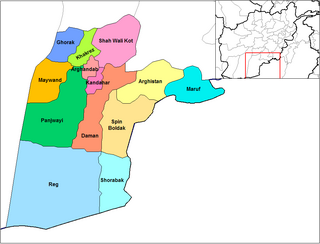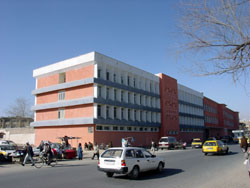
Gul Agha Sherzai, also known as Mohammad Shafiq, is a politician and former warlord in Afghanistan. He is a former governor of Nangarhar province in eastern Afghanistan. He previously served as Governor of Kandahar province, in the early 1990s and from 2001 until 2003. In October 2013, Sherzai resigned from his post as governor and formally announced himself as a candidate for Afghanistan's 2014 Presidential Election, and served as the minister of border and tribal affairs until the Taliban captured Afghanistan again in 2021.
Operation Athena was the Canadian Forces' contribution to the International Security Assistance Force (ISAF) in Afghanistan. The operation was divided in two phases: the first one took place from July 2003 to July 2005 in the Kabul region and the second one from August 2005 to December 2011 in the Kandahar area. The operation's main objective was to improve Afghanistan's security and governance. Operation Athena in Kandahar constituted the longest combat mission in the history of Canadian Forces. With over 40,000 Canadian military members that, at some point, entered the country—often several times—this operation constitutes the largest military deployment of the Canadian Forces since World War II.

Kandahār is one of the thirty-four provinces of Afghanistan, located in the southern part of the country, sharing a border with Pakistan, to the south. It is surrounded by Helmand in the west, Uruzgan in the north and Zabul Province in the east. Its capital is the city of Kandahar, Afghanistan's second largest city, which is located on the Arghandab River. The greater region surrounding the province is called Loy Kandahar. The Emir of Afghanistan sends orders to Kabul from Kandahar making it the de facto capital of Afghanistan, although the main government body operates in Kabul. All meetings with the Emir take place in Kandahar, meetings excluding the Emir are in Kabul.

The First Anglo-Afghan War was fought between the British Empire and the Emirate of Kabul from 1838 to 1842. The British initially successfully invaded the country taking sides in a succession dispute between emir Dost Mohammad Khan (Barakzai) and former King Shah Shujah (Durrani), whom they reinstalled upon occupying Kabul in August 1839. The main British Indian force occupied Kabul and endured harsh winters. The force and its camp followers were almost completely massacred during the 1842 retreat from Kabul.
Canada's role in the Afghanistan War began in late 2001. Canada sent its first element of soldiers secretly in October 2001 from Joint Task Force 2, and the first contingents of regular Canadian Armed Forces (CAF) troops arrived in Afghanistan in January–February 2002. The operations were aimed at identifying and neutralizing Al-Qaeda members in that country and toppling the Taliban regime which was supporting international terrorism. Canada's role in the Afghan conflict grew in 2006 when Canadian troops relieved US forces in Kandahar province, taking command of the multinational brigade in the region during a major Taliban offensive.

The 1989–1992 Afghan Civil War, also known as the FirstAfghan Civil War, took place between the Soviet withdrawal from Afghanistan and the end of the Soviet–Afghan War on 15 February 1989 until 27 April 1992, ending the day after the proclamation of the Peshawar Accords proclaiming a new interim Afghan government which was supposed to start serving on 28 April 1992.

Mullah Naqib Alikozai, sometimes called Naqibullah, was an Afghan mujahideen commander and politician from the Kandahar area of southern Afghanistan. He was the leader of the Alikozai Pashtun tribe.
Mohammad Yousef Pashtun is an Afghan technocrat and politician. He served as Minister of Urban Development and Housing for two terms and as Governor of Kandahar province in 2003, replacing Gul Agha Sherzai under President Hamid Karzai's administration. In 2010, he was appointed as Senior Adviser to President Karzai on Construction, Mines, Water & Energy. In 2014, minister Pashtun continued to serve as Senior Adviser to President Ashraf Ghani. Yِousef Pashtun is also chairing the Kabul New City Development Authority Board.

The Battle of Arghandab was an offensive launched by Afghan government forces, supported by Soviet troops, against mujahideen strongholds in the Arghandab District of Kandahar Province, Afghanistan, in 1987. The operation ended in failure, and the government forces withdrew after suffering heavy losses.

The Fall of Kandahar took place in 2001 during the War in Afghanistan. After the fall of Mazar-i-Sharif, Kabul and Herat, Kandahar was the last major city under Taliban control. Kandahar was where the Taliban movement had originated and where its power base was located, so it was assumed that capturing Kandahar would be difficult. The city fell after several weeks of fighting to a force of local militia under Pashtun military commanders and their American advisers. The fall of Kandahar signaled the end of organized Taliban control of Afghanistan.

The 205th 'Atul' (Hero) Corps was a corps-level formation of the Afghan National Army. Its headquarters were located in Kandahar and it was responsible for the south of the country, partnered with the ISAF's Regional Command South.

The Ministry of Finance of Afghanistan is responsible for the implementation and execution of the budget, collection of taxes, organization, and control of public expenses in Afghanistan; it also controls the management of the Custom Affairs. The Ministry of Finance provides a quarterly report to inform the public and the executive cabinet of advancements in Afghanistan's financial sector. The current Finance Minister is Nasir Akhund.
Ismatullah Muslim, also called Ismatullah Achakzai or just Ismat, was an Afghan militia leader, who in 1979 joined the mujahideen opposed to the communist PDPA and the Soviet invasion of Afghanistan, before coming over to the side of the government in 1984. Despite his military successes, Ismatullah Muslim was known for the many abuses he committed against civilians, made him a much hated figure throughout Afghanistan, except within his own tribe.
Events from the year 2010 in Afghanistan.

The Afghan conflict refers to the series of events that have kept Afghanistan in a near-continuous state of armed conflict since the 1970s. Early instability followed the collapse of the Kingdom of Afghanistan in the largely non-violent 1973 coup d'état, which deposed Afghan monarch Mohammad Zahir Shah in absentia, ending his 40-year-long reign. With the concurrent establishment of the Republic of Afghanistan, headed by Mohammad Daoud Khan, the country's relatively peaceful and stable period in modern history came to an end. However, all-out fighting did not erupt until after 1978, when the Saur Revolution violently overthrew Khan's government and established the Democratic Republic of Afghanistan. Subsequent unrest over the radical reforms that were being pushed by the then-ruling People's Democratic Party of Afghanistan (PDPA) led to unprecedented violence, prompting a large-scale pro-PDPA military intervention by the Soviet Union in 1979. In the ensuing Soviet–Afghan War, the anti-Soviet Afghan mujahideen received extensive support from Pakistan, the United States, and Saudi Arabia in a joint covert effort that was dubbed Operation Cyclone.

The Kabul Field Force was a field force created in September 1879 during the Second Anglo-Afghan War, under the command of General Frederick Roberts. It combined British Army and British Indian Army regiments, and initially numbered around 7,500 men, but later reached about 14,000.
2003 in Afghanistan. A list of notable incidents in Afghanistan during 2003

The Herat uprising, locally known as the Uprising of 24th Hūt was an insurrection that took place in and around the city of Herat in western Afghanistan, across several days in March 1979. It included both a popular uprising and a mutiny of ethnic Tajik Afghan Army troops against the Democratic Republic of Afghanistan (DRA). The communist regime at first appealed to its Soviet allies for help, but the Soviet leadership declined to intervene. After the insurgents seized and held the city for about a week, the regime was able to retake it with its own forces, and the subsequent aerial bombardment and recapture of Herat left 3,000 to 25,000 of its inhabitants dead. It was the worst outbreak of armed violence in the country in 50 years, and was the deadliest incident in the 1978-1979 period following the Saur Revolution and before the start of the Soviet occupation.
Nur ul-Haq Ulumi is an Afghan politician, who served as Interior Minister from 2015 to 2016, and as a Member of the House of the People from 2005 to 2010 representing Kandahar. He founded and previously led the National United Party of Afghanistan, a small left-wing and secular party in Afghanistan that is a member of the National Coalition of Afghanistan. Ulumi previously served in the Afghan Army as a member of the Parcham faction of the People's Democratic Party of Afghanistan during the Afghan Civil War (1989–1992), and left service with the rank of lieutenant general. He was a candidate in the 2019 Afghan presidential election.

The Battle of Kandahar began on 9 July 2021, as Taliban insurgents assaulted the city to capture it from the Afghan National Security Forces (ANSF). After heavy fighting for weeks the city's defenses had started to dissolve in August. This allowed the Taliban to enter and overrun most of the city on 12 August 2021, including the Sarposa prison, which included the release of over 1,000 prisoners, and ultimately the capture of the city. However, the siege for the nearby airport continued, where government loyalists held out until being evacuated on 16 August.













